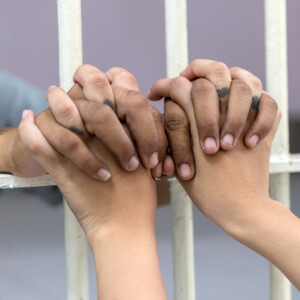I was re-reading the mission of the Episcopal Community Foundation recently, to provide support and financial resources to ministries in our churches and communities that “lift up people facing poverty and oppression.” Specifically, ECF supports efforts around certain areas of ministry: hunger, homelessness, generational poverty, refugee services, human trafficking, and those whose lives have been impacted by the criminal justice system.

I confess to musing rather cynically that maybe the criminal justice system was the last item on the list because it is the last thing many of us wish to think about or be involved in. But events in recent weeks stemming from the murders of Ahmaud Aubrey, George Floyd, Rayshard Brooks, and far too many others have made it very difficult not to think about issues of justice in our society. They reveal once again our nation’s festering wounds and malignant sores that have never healed after hundreds of years. As our Bishop has said to those who have ears to hear, “From the founding of our country we have had a white supremacy problem.” This is painful for many of us to hear, a stark and unavoidable reality we must force ourselves to acknowledge, as Christians, as the church. A mature faith demands that we reflect more honestly upon many things, including issues of justice. It is increasingly evident that what we have is a system of injustice, mass incarceration which operates more like a system of racial and social control than a system of crime prevention and control, according to Michelle Alexander in her book The New Jim Crow: Mass Incarceration in the Age of Colorblindness.
Our scriptures have much to say about justice in both the Old and New Testaments. Dr. Walter Brueggemann (a reliable go-to mentor on all things Old Testament) has offered a diagnosis. We, specifically the church, have separated love of God from love of neighbor, as if we thought it possible to love God without loving our neighbor. It is not. In fact, love and care for one’s neighbor are the way we are to act out and exhibit one’s love of God. As true for Israel and Judea as it is for us today, under God’s justice system, “Doing justice is the prophetic invitation to do what needs to be done to enable the poor and disadvantaged and the neglected to participate in the resources and wealth of the community. Injustice is the outcome of having skewed neighborly processes so some are put at an unbearable disadvantage.” Or as Reinhold Niebuhr put it, “Love is the motive, but justice is the instrument.”
This is a spiritual malignancy that can and will prove fatal for our nation if not treated.
God’s justice system reveals how our human system of justice is tragically—we might even say demonically—skewed. It seems designed specifically to yield “unbearable disadvantage” to those already disadvantaged. Even then, it is but one system in a web of systems based upon assumptions and the preservation of white supremacy. This is a spiritual malignancy that can and will prove fatal for our nation if not treated. Christians know by faith that there is a “balm in Gilead” that will heal the sin-sick wounds and festering sores of our national trauma. The medicine is repentance and reparation. It is the only way to restore right relationship with one another, and with God. Jesus reveals that the God of the universe is the God whose power is love and mercy. But we should not expect to receive merciful divine healing until we at least know how much we need it, and are willing to ask for it. Only then we will be ready to begin working towards God’s justice for all persons.

